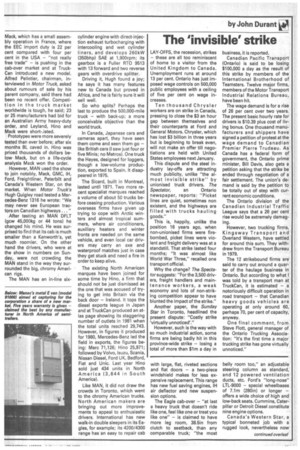The 'invisible' strike
Page 37

If you've noticed an error in this article please click here to report it so we can fix it.
LAY-OFFS, the recession, strikes — these are all too reminiscent of home to a visitor from the United Kingdom to Canada. Unemployment runs at around 13 per cent. Ontario has just imposed wage controls on 500,000 public employees with a ceiling of five per cent on wage increases.
Ten thousand Chrysler workers are on strike in Canada, pressing to close the $3 an hour gap between themselves and their counterparts at Ford and General Motors. Chrysler, which has lost $3 billion in three years but is beginning to break even, will not make an offer till negotiations are held with United States employees next January.
This dispute and the steel industry lay-offs are attracting much publicity, unlike "the almost invisible strike" by unionised truck drivers. The Spectator, an Ontario newspaper, reports: "Picket lines are quiet, sometimes non existent, and the highways are filled with trucks hauling goods."
This is, happily, unlike the position 16 years ago, when non-unionised firms were firebombed, picket lines were violent and freight delivery was at a standstill. That strike lasted four months; "It was almost like World War Three," recalled one transport official.
Why the change? The Spectator suggests: "For the 3,500 drivers, freight handlers and maintenance workers, a weak economy and lots of non-striking competition appear to have blunted the impact of the strike."
Another paper, the Sunday Star in Toronto, headlined the present dispute: "Costly strike 'virtually unnoticed`."
However, such is the way with so much industrial action, some firms are being badly hit in this province-wide strike — losing a total of more than $1m a day in business, it is reported.
Canadian Pacific Transport (Ontario) is said to be losing $100,000 a day as the result of this strike by members of the International Brotherhood of Teamsters. Twelve major firms, members of the Motor Transport Industrial Relations Bureau, have been hit.
The wage demand is for a rise of 26 per cent over two years. The present basic hourly rate for drivers is $10.39 plus cost of living bonus. One thousand manufacturers and shippers have signed a petition of protest at the wage demand to Canadian Premier Pierre Trudeau. As Canada has a federal form of government, the Ontario prime minister, Bill Davis, also gets a petition asking that the strike be ended through negotiation of a fair settlement. The union's demand is said by the petition to be totally out of step with current economic conditions.
The Ontario division of the Canadian Industrial Traffic League says that a 26 per cent rise would be extremely damaging.
However, two trucking firms, Kingsway Transport and Overland Western, have settled for around this sum. They withdrew from the Transport Bureau in 1979.
The '12 strikebound firms are said to carry out around a quarter of the haulage business in Ontario. But according to what I was told by a transport man at TruckCan, it is estimated — a notoriously difficult operation in road transport — that Canadian heavy goods vehicles are operating at only around 60, perhaps 70, per cent of capacity, anyway.
One final comment, from Steve Flott, general manager of the Ontario Trucking Association: "It's the first time a major trucking strike has gone virtually unnoticed."












































